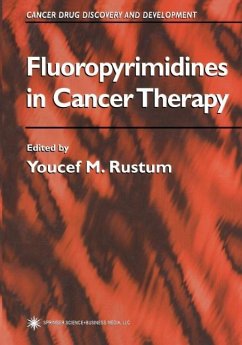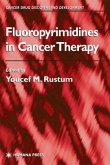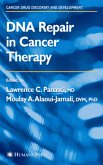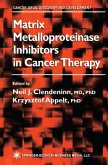Leading cancer researchers update and review the mechanisms of action and the therapeutic selectivity and efficacy of 5-FU with and without leucovorin and its prodrugs in the treatment of colorectal cancer. Among the combination agents considered are UFT/LV, 5-FU/EU, capecitabine (Xeloda), S-1, and a variety of thymidylate synthase inhibitors. The authors discuss the potential advantages and disadvantages of these varied drugs and their mode of administration. Based on historical results with these agents when used alone, they also present a rationale for their results when used in combination with other agents. Although the action of the standard chemotherapeutic agent for the treatment of advanced colorectal cancer (5-fluorouracil or 5-FU) was improved significantly by combining it with leucovorin (LV), the improved response rate was associated with significant side-effects in approximately thirty percent of patients. In Fluoropyrimidines in Cancer Therapy, leading cancer researchers update and review the mechanisms of action and the therapeutic selectivity and efficacy of 5-FU, with and without LV and its prodrugs, in the treatment of colorectal cancer. Among the combination agents considered are Orzel (UFT/LV), 5-FU/Eniluracil (5-FU/EU), capecitabine (Xeloda), S-1, and a variety of thymidylate synthase inhibitors. The authors discuss the potential advantages and disadvantages of these varied drugs and their mode of administration. Based on the historical results with these agents when used alone, they also present a rationale for their results when used in combination with other agents.
Authoritative and integrative, Fluoropyrimidines in Cancer Therapy summarizes the latest preclinical and clinical experiences using fluoropyrimidines to treat colorectal cancer, delineates the underlying mechanisms and choices for therapy, describes the ongoing search to identify ever more effective and selective agents with novel mechanisms of action, and details the development of new mechanism-based combination therapies.
Authoritative and integrative, Fluoropyrimidines in Cancer Therapy summarizes the latest preclinical and clinical experiences using fluoropyrimidines to treat colorectal cancer, delineates the underlying mechanisms and choices for therapy, describes the ongoing search to identify ever more effective and selective agents with novel mechanisms of action, and details the development of new mechanism-based combination therapies.








